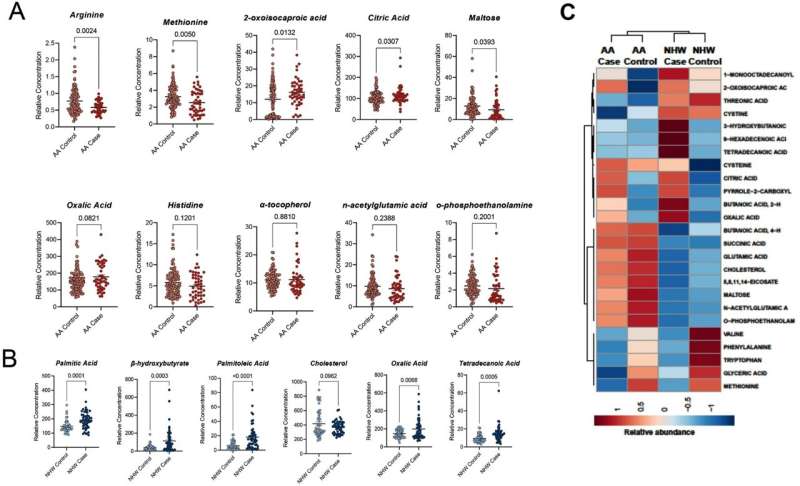This article has been reviewed according to Science X's editorial process and policies. Editors have highlighted the following attributes while ensuring the content's credibility:
fact-checked
peer-reviewed publication
trusted source
proofread
ER-positive breast cancer presents differing metabolic signatures in African American, white women: Study

New research has found the most common form of breast cancer presents differing metabolic signatures in the blood of African American women with estrogen receptor-positive breast cancer compared with non-Hispanic white women. The scientists also identified a protein—negative elongation factor complex E—that was linked with higher mortality rates among African American women with estrogen receptor-positive breast cancer.
The findings, published online by Scientific Reports, may help explain some of the molecular processes driving higher rates of the disease—especially more aggressive forms of it—in African American women. ER-positive breast cancer accounts for about 70%-80% of all breast cancer cases, and African American women are 40% more likely to die from it than white women, said Zeynep Madak-Erdogan, a professor of nutritional sciences and of food science and human nutrition at the University of Illinois Urbana-Champaign and co-author of the paper.
Ashlie Santaliz-Casiano, a then-graduate student at the university, was the first author of the study. Madak-Erdogan, the corresponding author, oversaw the project along with Jonna Frasor, a professor of physiology and biophysics at the U. of I. Chicago; and Dr. Kent F. Hoskins, a professor of medicine in the UIC College of Medicine and director of the UIC Familial Breast Cancer Program. Researchers at Northwestern University, Northwestern Memorial Hospital and Northeastern University were partners on the project.
"Overall, we are pretty good at managing the disease, early diagnosing cases with mammography and treating them with drugs that were developed several decades ago," Madak-Erdogan said.
"Although the tumors are often caught at earlier stages, patients from lower-income neighborhoods such as Chicago's South Side are more likely to have poor outcomes. That suggests there are some biological factors driving these differing effects," she said.
The study population included African American women and non-Hispanic white women ages 20-79 who were recruited at three hospitals in the Chicago area in 2018–19.
The team collected blood samples from 102 patients who were newly diagnosed with ER-positive breast cancer in stages 1–3, and 148 healthy women served as the control group. The samples were collected from control group participants at the time they enrolled in the study and from the patients with ER-positive breast cancer prior to breast surgery or other cancer treatment.
"The participants were matched on characteristics such as similar tumor types, similar body mass indices or other factors so we could examine the effects of their neighborhoods and economic backgrounds," Madak-Erdogan said.
The team analyzed 83 metabolites in the women's blood and found that African American women with ER-positive breast cancer had decreased circulating levels of amino acids—including the antioxidant methionine—compared with women in the healthy control group. Conversely, non-Hispanic white patients with the disease had significantly higher levels of fatty acids compared with African American women and those in the healthy control group.
The team hypothesized that methionine might be needed in greater volume to support increased DNA methylation—a mechanism that controls which genes get expressed—in African American patients with the disease, Madak-Erdogan said.
Hypermethylation is a possible biological mechanism that might explain poorer disease outcomes in African American women, she said. Aberrant hypermethylation in DNA can occur in the promoter and enhancer regions of cancer-related genes, including tumor suppressors, silencing their expression.
"Using the Pan-Cancer Atlas, a database of 33,000 tumors classified by genetic similarity maintained by the Cancer Genome Atlas Program, we mapped the metabolites to epigenetic regulatory systems," said Santaliz-Casiano, currently a postdoctoral researcher at the National Cancer Institute in the National Institutes of Health. "We identified 291 genes associated with methylation activities that were expressed at higher rates—15 of them at statistically significant levels—in African American women with ER-positive breast cancer."
Poorer survival rates among African American women with the disease—but not non-Hispanic white women—were associated with higher expression of the gene NELFE, a protein complex that regulates enzymes involved in transcriptional activities for downstream target genes, she said.
Tumor cells utilize amino acids as alternative fuels and as precursors for processes such as DNA synthesis, constructing new blood vessels and promoting tumor cells' rapid growth and proliferation.
In a previous study, published in the journal Cancer Research in 2019, a group led by Madak-Erdogan found that higher blood levels of free fatty acids "rewired" cancer cells' metabolism, activating pathways that promoted tumor growth and proliferation in postmenopausal obesity-related cancer. The current study extends that work by identifying key differences by race: While higher fatty acid levels are good predictors of ER-positive breast cancer in non-Hispanic white women, higher amino acid levels are better predictors of the disease in African American women.
"These metabolic differences might suggest that there would be different screening strategies that could identify worse types of breast cancers," Madak-Erdogan said. "These assays might enable earlier diagnosis based on patients' blood. I imagine that it would not be difficult to design a cost-effective blood test for this purpose.
"The current standard screening is mammography, but it requires costly, dedicated equipment, as well as technicians and other trained professionals. If we could come up with a test to diagnose breast cancers earlier, especially those with potentially worse outcomes, that might be useful in clinics with limited resources."
More information: Ashlie Santaliz-Casiano et al, Identification of metabolic pathways contributing to ER+ breast cancer disparities using a machine-learning pipeline, Scientific Reports (2023). DOI: 10.1038/s41598-023-39215-1



















